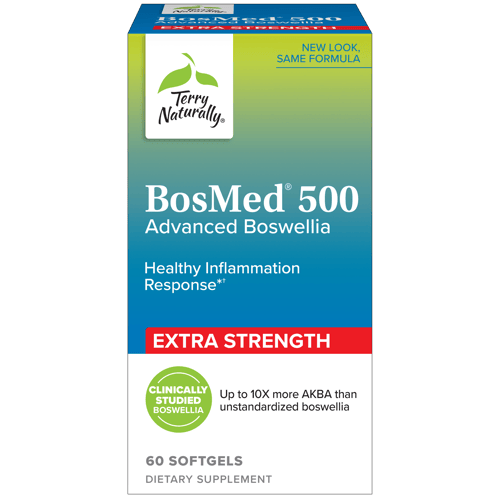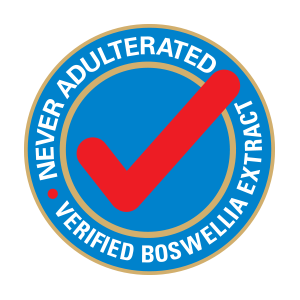BosMed® 500 Extra Strength

- SKU
- bosmed-500
Product Description
- Overall cellular protection^
- Healthy inflammation response*†
- Clinically studied and uniquely standardized
Advanced Boswellia for Overall Health*
BosMed 500 provides an advanced boswellia that can support your health in ways many other forms of boswellia cannot.*
Ancient Wisdom Meets Modern Science
Boswellia has been a vital component of Ayurvedic medicine for thousands of years. Unique among botanicals, it supports pathways in the body untouched by other compounds.* BosMed 500 is clinically studied and uniquely standardized to provide more AKBA—an important compound—and virtually no pro-inflammatory beta-boswellic acid.
With BosMed 500 you get the most advanced boswellia extract—a true, expertly balanced boswellia with all the beneficial components you need.
Up to 10 times more AKBA than unstandardized boswellia!

Supplement Facts
Supplement Facts
| Ingredient | Amount/Serving | Daily Value |
|---|---|---|
| Calories | 5 | |
| Total Fat | 0.5 g | <1%† |
| Boswellia (Boswellia serrata) | 500 mg | ** |
Gum Resin Extract (BOS-10®) standardized to **Daily Value (DV) not established. |
||
If pregnant or nursing, consult a healthcare practitioner before use.
FAQ
Frequently Asked Questions
What makes the boswellia in BosMed 500 different from other boswellia supplements?
Boswellia has a number of beneficial compounds, AKBA (acetyl-11-keto-B-boswellic acid) being one of them. In fact, it supports pathways in the body that even other strong botanicals can't. However, unstandardized boswellia can also contain beta-boswellic acid, which is not associated with optimal benefits. The boswellia in BosMed 500 uses a unique process that ensures at least 10% AKBA, and virtually no boswellic acid, so you get the benefits you need—and none of the compounds that you don't want.
Where is the boswellia in BosMed 500 obtained?
The boswellia used in BosMed 500 is harvested from trees growing in northwest India. The trees are under the supervision of the Department of Forestry, which carefully controls harvest frequency and other issues of sustainability. Many of the sustainability concerns regarding boswellia are associated with a different species of boswellia - Boswellia papyrifera - which is a very fragrant species harvested for use in the perfume and incense industries.
Is your boswellia sustainably sourced?
Yes. The boswellia we use is grown traditionally in India and harvested under the oversight of the Department of Forestry, which carefully controls harvest frequency and other issues of sustainability. The boswellia family contains over 20 species, and each species may be subjected to different sustainability concerns. We only use Boswellia serrata that is sustainably harvested and therefore does not contribute to the problems facing other species of boswellia.



